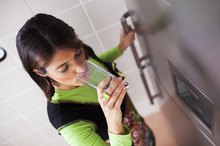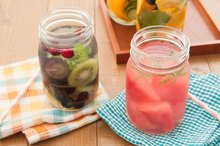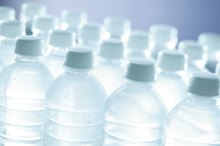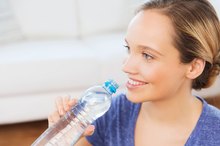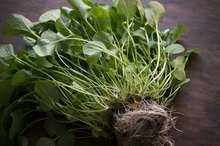How Long Will Drinking Water Keep?
Differences
The question of how long drinking water will keep can only be answered by knowing what type of water was stored and how it was stored. There is a difference between commercially bottled water and water from a public water supply you store yourself.
Length
Most commercially bottled water will have an expiration date. Even if no expiration date is provided, the shelf life should be approximately one year. For water that comes from your faucet, pumped there by a municipal water source and stored in plastic containers, the water should be replaced every six months.
Storage Containers
How to Tell If Your Water Is Too Soft
Learn More
The storage container and the storage containers are factors that determine the length of time stored water will remain good. All water should be stored in containers made of food-grade plastic or designed specifically for the storage of water. Most containers will have embossed somewhere on the outside "HDPE" or "PP," or a recycle triangle with the numbers "1" or "2" inside the triangle. But not all "HDPE" with the "2" triangle is food grade. That's why it is best to use containers that have contained food or drink previously, such as soda bottles, milk bottles or containers designated as specifically for storing water. Ideally, a 2-liter soda bottle will store water better than a reused milk jug. The plastic in the milk jug-type bottles tends to break down over time, leeching plastic into the water.
- The storage container and the storage containers are factors that determine the length of time stored water will remain good.
- That's why it is best to use containers that have contained food or drink previously, such as soda bottles, milk bottles or containers designated as specifically for storing water.
Chlorine
If you fill bottles with tap water from a municipal water source, there is usually enough chlorine in the water to keep it safe for six months or longer. If you are filling bottles with water from a well, add one or two drops of plain, unscented bleach to each bottle.
Storage
The Best Refrigerator Water Filters
Learn More
Storing the water in temperatures of 35 to 50 degrees F will extend the shelf life, while freezing the water will help it last almost indefinitely. Make sure you leave about 2 inches of air space at the top of the bottle to allow for the water to expand as it freezes. Even if water has been stored for longer than the recommended time, as long as it has been stored out of direct sunlight to prevent algae growth, it can still save your life. It just might not taste that good. Pouring such water back and forth between two jugs will aerate it by infusing oxygen back into the water. This will usually improve the taste of "flat" water.
- Storing the water in temperatures of 35 to 50 degrees F will extend the shelf life, while freezing the water will help it last almost indefinitely.
Related Articles
References
- Rosario-Ortiz F, Rose J, Speight V, Von Gunten U, Schnoor J. How do you like your tap water?. Science. 2016;351(6276):912-914. doi:10.1126/science.aaf0953
- National Resource Defense Council. Bottled water: Pure drink or pure hype?. Updated February 1999.
- Centers for Disease Control and Prevention. Bottled water. Basics. Updated April 2014.
- Centers for Disease Control and Prevention. Camping, hiking, travel. Updated February 2018.
- Kim SK, Park SW, Kang SM, Kwon HK, Kim BI. Assessment of the erosive potential of carbonated waters. J Korean Acad Oral Health. 2015;39(4):273-279. doi:10.11149/jkaoh.2015.39.4.273
- Quattrini S, Pampaloni B, Brandi ML. Natural mineral waters: chemical characteristics and health effects. Clin Cases Miner Bone Metab. 2016;13(3):173-180. doi:10.11138/ccmbm/2016.13.3.173
- James LJ, Mattin L, Aldiss P, Adebishi R, Hobson RM. Effect of whey protein isolate on rehydration after exercise. Amino Acids. 2014;46(5):1217-1224. doi:10.1007/s00726-014-1680-8
- Fleming N, Vaughan J, Feeback M. Ingestion of oxygenated water enhances lactate clearance kinetics in trained runners. J Int Soc Sports Nutr. 2017;14(1):9. doi:10.1186/s12970-017-0166-y
- Cleveland Clinic. Electrolyte drinks: Beneficial or not?. Updated April 2019.
- Li L, Seeram NP. Further investigation into maple syrup yields 3 new lignans, a new phenylpropanoid, and 26 other phytochemicals. J Agric Food Chem. 2011;59(14):7708-7716. doi:10.1021/jf2011613
- Kalman DS, Feldman S, Krieger DR, Bloomer RJ. Comparison of coconut water and a carbohydrate-electrolyte sport drink on measures of hydration and physical performance in exercise-trained men. J Int Soc Sports Nutr. 2012;9(1):1. doi:10.1186/1550-2783-9-1
- Cleveland Clinic. Alkaline water: Don’t believe the marketing hype. Updated October 2013.
- Weidman J, Holsworth RE, Brossman B, Cho DJ, Cyr JS, Fridman G. Effect of electrolyzed high-pH alkaline water on blood viscosity in healthy adults. J Int Soc Sports Nutr. 2016 Dec 1;13(1):45. doi:10.1186/s12970-016-0153-8
- Mumme K, Stonehouse W. Effects of medium-chain triglycerides on weight loss and body composition: a meta-analysis of randomized controlled trials. J Acad Nutr Diet. 2015;115(2):249-263. doi:10.1016/j.jand.2014.10.022
- Cleveland Clinic. Hydration. Updated May 2019.
Writer Bio
CL Hendricks has been writing professionally for four years, primarily content for a variety of websites she designed and managed. For Demand Studios she prefers writing about medical conditions and symptoms, alternative medicine, and survival preparedness, often drawing on personal experience or training to guide the direction of the articles.

